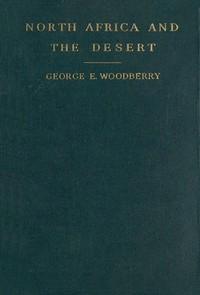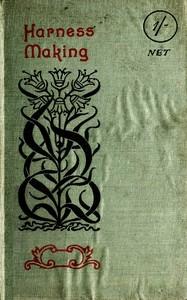|
|
Read this ebook for free! No credit card needed, absolutely nothing to pay.Words: 79068 in 8 pages
This is an ebook sharing website. You can read the uploaded ebooks for free here. No credit cards needed, nothing to pay. If you want to own a digital copy of the ebook, or want to read offline with your favorite ebook-reader, then you can choose to buy and download the ebook.

: North Africa and the desert by Woodberry George Edward - Africa North Description and travel; Sahara Description and travel@FreeBooksThu 08 Jun, 2023 y been its culture and occupancy, all had lapsed back to the primitive; a land of plains--melancholy tracts under a gray sky or vast empty spaces under a brilliant sun--edged in far distance by lone mountains, caressed on broken shores by a barren sea; full of solitude, sadness. Here and there some great ruin stood, not unlike Stonehenge on Salisbury Plain, or even cities of ruins; the land is strewn with them--temples, courts, baths, cisterns, floors, columns, reliefs, arches of triumph, theatres; but they seldom count to the eye. Antiquity, like the frontier, is also a thing of the mind, in the main; the past and the future are both matter of reflection, in the background of memory and knowledge it may be, but not noticeable in the general landscape. It is a place where human fate seems transitory, an insignificant detail, as on the sea--or like animal life in nature, indifferent. IV Once on such an excursion on the eastern seacoast, the Tunisian Sahel, I left Sousse behind in the noon glare, a busy, thriving, pleasant place, swarming with Arab life in its well-worn ancestral ways and with French enterprise in its pioneering glow. The old Saracen wall lay behind me towered and gated, a true mediaeval girdle of defence, and I gazed back on the white city impearling its high hillside in the right Moslem way, and then settled myself to the long ride southward as I passed through cemeteries, crisscrossed with Barbary fig, and by gardens adjoining the sea, and struck out into the plain, spotted with salty tracts and little cultivated. It is thus that a ride on this soil is apt to begin--with a cemetery; it is often the master note that gives the mood to a subsequent landscape, a mood of sadness that is felt to be sterile also, impregnated with fatalism. A Moslem burying-ground may be, at rare places, a garden of repose; a forsaken garden it is usually, even when most dignified and beautiful with its turbaned pillars in the thick cypresses; but it is always a complete expression of death. The cemetery lies outside at the most used entrance of a town; and, as a rule, in the country it is of a melancholy indescribable--it lies there in so naked a fashion, a hopeless and huddled stretch of withered earth in swells and hummocks, hardly distinguishable from common dirt and d?bris--the eternal potter's field. It is a fixed feature in the Tunisian landscape, which is made of simple elements, whose continuous repetition gives its monotony to the land. A ride only rearranges these elements under new lights and in new horizons. Here the great plain was the common background; my course to Sfax lay over it, broken at first by a blossoming of gardens round a town or village, and twice I came out on the sea; but always the course was over a plain with elemental mark and quality--with an omnipresence as of the sea on a voyage. The line between man's domain and nature is as sharply drawn on this plain as on a beach; where man has not labored the scene stretches out with nature in full possession, as on the ocean; his habitations and territory are islands. Everything is seen relieved on great spaces, individualized, isolated; fields of grain, green and moving under a strong land wind; or olive groves--silvery gleams--on the hillsides, clumps of trees, or long lines of them, whole hillsides, it may be; or there are gardens, closed, secluded, thickly planted with pear or peach or fig or other fruit, with vegetables, perhaps, beneath and palms above. The figure scenes, too, are of the same recurring simplicity--a man leading a spirited horse in the street, a camel meagre and solemn and solitary silhouetting the sky anywhere within a range of miles, boys in couples herding sheep in the middle distances. The town or village emerging at long intervals is a monochord--a point of dazzling white far off, dissolving on approach into low houses, a confused mass of uneven roofs skirting the ground except where the minaret and the palm rise and unite it to heaven--to the fire-veined evening sky, deep and tranquil, or the intense blue noon, or the pink morning bloom of the spiritualized scene of the dawn. The streets are silent; by the Moorish caf? lie or sit or crouch motionless figures, sometimes utterly dull, like logs on the earth, or else holding pipes or gazing at checkers, or vacant--always somnolent, statuesque, sedentary. There are no windows, no neighborhood atmosphere--only a stagnant exterior. The feeling of a retreat, of repose, of being far away is always there. These towns have a curious mixture of the eternal and the ruined in their first aspect; as of things left by the tide, derelicts of life all. A ride in the Sahel is a slow, kaleidoscopic combination of these things, a reiteration without new meaning--the town, the cemetery, the grove, the garden, the plain, the fields, camels and sheep, and herdboys--horizons, somnolence, tranquillity. What a ride! and then to come out on the sea at Monastir and Mahdia--such a homeless sea! There may be boats with bending sails, the fisher's life, suggesting those strange outlying islands they touch at, exile islands from long ago, where Marius found hiding, and where the Roman women of pleasure of the grand world were sent to live and die, out of the world--still the home of a race, blending every strain of ancient blood. Mahdia, once an Arab capital and long a seat of power in different ages, is a famous battle name in Mohammedan and crusading and corsair annals; it stood many a great siege on its rocky peninsula, in Norman and other soldiering hands, however lifeless it may seem now; but as one looks on its diminutive harbor, a basin hewn in the rock, it seems now to speak rather of the enmity of the sea and the terror of tempest on this dangerous coast--shallow waters and inhospitable shores. History, human courage, was but a wave that broke over it, and is gone like the others, a momentary foam; but the sea is always the sea. Everywhere one must grow familiar with the neighboring coast-line before the sea will lay off that look of enmity it wears to all at the first gaze; it is foreign always by nature. To descend here at Mahdia, and to walk by its waves, to hear its roll, to look off to its gulfs and hilltops afar, however brilliant may be the scene, is to invite the deepest melancholy that the waste sea holds--so meaningless that world lies in its monotony all about. I remembered the Moorish prince who here, after his long victories, stood reflecting on the men who were great before him, and how their glory was gone. It is a more desolate port now. One gladly turns to the land--and there meets the plain, equally vaguely hostile. So I rode on by the unceasing stretch of the way, through town and by garden and grove, into the ever-enveloping plain that opened before. It was like putting to sea at every fresh start; and late in the afternoon, on the last far crest of the rolling plain, I saw the great ruin, El Djem, that rose with immense commanding power and seemed to dominate a world of its own sterile territory. It is a great ruin--a colosseum; arches still in heaven, and piled and fallen rocks of the old colossal cirque; it still keeps its massive and uplifted majesty, its Roman character of the eternal city cast down in the waste, its monumental splendor--a hoar and solemn token of the time when there were inhabitants in this desolation to fill the vast theatre on days of festival, and the line of its subject highway stretched unbroken to Tunis and southward, a proud, unending urban way of villas, a road of gardens, where now only stagnates the salty plain, sterile, lifeless. The hamlet beside it is hardly perceptible, like a mole-hill, a mere trace of human life. I sat out the sunset; and after, under a cold, starry sky, Orion resplendent in the west and the evening star a glory, I set off again by the long road through the sparkling April darkness and a wind that grew winter-cold with night, southward still--the vast heavens broken forth with innumerable starry lights--till after some hours of speeding on a route that was without a living soul, I came again on belated groups of walking Bedouins and fragrant miles of gardens dark by the roadway and many a thick olive grove, and drew up at Sfax. V Sfax is the southern capital of Tunisia. It has always been an important site, and under the new rule of the French thrives and prospers commercially, in true frontier fashion, as the chief market and base of the country being opened up in the inland behind it whose seaport it is. It is also an old Mohammedan stronghold, and its inherited life and customs go on, as at Sousse, in the immemorial Arab ways. I remember it as the city of the olive and the sponge. In the early morning light the open spaces about the market were littered with young boys at their open-air breakfast, which may be seen at most Mediterranean seaports on the Moslem side--the vender beside his cooking apparatus, the boys with saucers of soup or sops of bread, and on all sides the beginnings of labor; but all this meagre human life was framed in an exquisite marine view beyond. The wharf was thickly lined with the strange-looking boats of the sponge-fishers, their Greek flags at half-mast in honor of Good Friday, their sailors in Albanian costumes, their gear heaping the open spaces with ropes and nets and endless tackle. It was all charming, one of the vignettes of travel that will haunt the memory for years--the odors, the little tasks, the look of the toil of the sea, the sponges in dark heaps, the blue, limpid morning air crossed with strange spars and ropes, and the host of fluttering flags. Later in the day I got its companion scene from a hilltop some miles south of the city, whence one commands a view of olive orchards sloping down in one vast grove, in lines of regular intervals, as far as the eye can reach, and lost to sight on all sides with nothing to break the expanse--only millions of olive-trees regularly planted, filling the entire broad, circling landscape. A little tower surmounts the hilltop and from its round apex one surveys the whole; the sense of this dot-like centre enhances the impression that the scene makes of a living weft of mathematical lines, like an endless spider's web. It is a unique sight. The geometrical effect is curious, like an immense garden-diagram; the similarity of the round, bullet-like heads of the trees, all alike in shape, is a novel trait of monotony; the silver-gray of the foliage, mixed with the reddish tones of the soil, gives, in so broad a view, a ground earth color quite new to the eye; and the sense of multitude in which, nevertheless, individuality remains persistent and acutely distinct on so vast a scale makes an indelible impression. VI I seek in vain the secret of the charm that Tunis lays upon me. Coming back to it, one feels something intimate in the city, such as there is in places long lived in and cherished, impregnated with memories, subtilized by forgotten life and feeling. It has sunk deeper into the senses, the affections. Can the charm be merely its soothing air, its weather, which, after all, is our physical element? It has a marvellous sky; all hues that are celestial and live in heaven are there. What clarity! Its changeable blues excite and call the eye from hour to hour; and on rainy days its grays are soft, enveloping mantles for the sight. Its peculiar trait is a greenish tint in the blue, pervasive but not defined, an infusion of clear emerald, translucent, such as one sees in winter sunsets in New England; but here in early summer you will distinguish it at high noon, after the rainless days of late spring. Tradition associates heat with this coast, as with the Mediterranean generally; but that is an illusion of the foreigner. Tunis is often chilly, bitterly cold at times, though without the fall of snow; it lies under the heights of the Atlas, and the winds bring down the snow-chill on their wings. I remember one February when there were no trains from Algiers for five days, the snow blocking the road; it lay, at some places on the line, nine feet deep. But whatever may be the weather, the atmospheric charm remains; it is soothing, and has narcotic quality. A fine landscape in fine weather is always captivating and assimilates the traveller to the land. One is always at home in the sun; and a noble view finds a friend in every eye. One or two such experiences will make the fortune of a whole journey and after a while be its whole memory. But in some regions, some cities, the spell is perpetual; it is so at Tunis. The prospect is broad, and wherever one turns the eye wanders off delightfully. The most complete view is from the western hill, where is a beautiful great park of rolling land with woods whence you will see the white city southward; it lies like a great lily on its pads of green background, with its motionless blue waters round about--a lake-country scene; level waters like a flood, all floored and streaked with purple and blue bands and reaches--a water prairie--to where Carthage gleams white on its own green hill, amid an horizon of snowy villages dazzling in the sun; and between, nearer, isolated roofs that flash emerging from their obscure green gardens and tree-clumps, here and there; farther still to the southeast, as the eye travels out over the long lake into the gulf and the sea, rises a mass of mountain blues that bound the entrance to the land and its harbors. It is a view fit for a Greek amphitheatre. Wherever you go, you are always coming out on these massive, spacious, beautifully colored prospects, white strips of city or village amid the spring, set in the master tone of blue that envelopes and combines them--sky, and lake, and sea, themselves infinitely changeable with the light and the distance and the hour. Even in the most unexpected places Heaven will open these far-off ways over a new land. I remember going into an obscure and blind street, in the Arab quarter, among buildings in all stages of apparent decay. I lifted the knocker at the lovely, nail-studded door of an ancient-looking house, and passed at once into an inner court with a fountain, beautifully decorated, cool, shadowy, exquisite in repose and the sense of luxury; and I was led on through a maze of stairways and passages till I came out on a large room below the roof with a balcony; and stepping forward, I saw unrolled as if by enchantment the whole sea-view. There must be many such commanding points of vantage in the houses on the crest of the thickly built hill--old Tunis, where the Arabs live. From this station I overlooked the lower city with all its roofs and streets. The multitude of green-tiled roofs on different levels made the color-ground, whence rose the numerous low, white domes, the slender minarets also touched with green or tipped with golden balls, the greater domes of the mosques, the mass of the citadel; broad French faubourgs and avenues were enclosing and defining lines, with irregular masses of foliage, and deep, narrow streets sank in the near scene, full of their native life. It was an architectural wilderness of form and color, arresting, vivifying, oriental in mass, feeling and detail, with the suggestion of a dream, of evanescence, and round it was poured on all sides the still blue element--sky, ocean, air. In Tunis, I noticed, everything seemed to end thus, in something beyond, in a mood; life constantly distilled its dream, and it was a dream of the senses. Free books android app tbrJar TBR JAR Read Free books online gutenberg More posts by @FreeBooks
: Harness making by Hasluck Paul N Paul Nooncree Editor - Harnesses; Horses Equipment and supplies; Harness making and trade@FreeBooksThu 08 Jun, 2023

: Up the ladder; by Leslie Madeline Hyde John N Illustrator - Christian life Juvenile fiction; Merchants Juvenile fiction; Diligence Juvenile fiction; Success Juvenile fiction; Apprentices Juvenile fiction; Alcoholics Juvenile fiction@FreeBooksThu 08 Jun, 2023
|
Terms of Use Stock Market News! © gutenberg.org.in2025 All Rights reserved.






